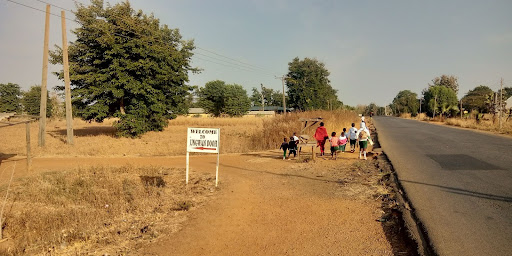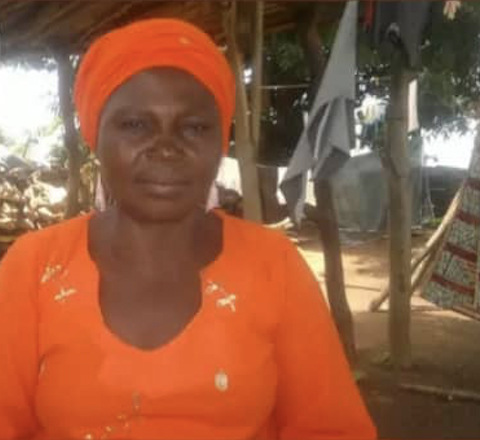‘Bloody Saturday’: Victims Tell Of Violence In Southern Kaduna Community
Unguwan Wakili, part of Zangon Kataf LGA of Kaduna State, northwest Nigeria was attacked on March 11. At least 17 people were killed and several others injured, HumAngle spoke with victims who lost loved ones.

Joel Isah Tonak is anguished by his close shave with death.
He does not know whether he should feel relieved that he stepped out of his home on that “Bloody Saturday” March 11, or feel guilty. He survived, members of his family did not.
He had gone to visit a friend, it was after dark when he heard gunshots.
Some may have chosen to flee in the opposite direction to get away from the violence, even if it was their very own residence that was burning.
But not Tonak, a youth of 20. He ran toward his home, and the gunfire.
He did it without thinking, he just needed to know right then what had happened to his family.
Corpses
When he got there, he was stepping over corpses – right there on the floor was his grandmother’s body. Here was his stepmother. Then over there, his brother and sister. It was too much to take all at once.
Later, he learned his father and mother narrowly escaped. But everything is still hazy for Tonak, the reality has not yet set in, even days later.
Tonak comes from a large family, his father lived with Tonak’s mother and his stepmother. There was also an extended family living with them.
“I can’t really tell you how many we are,” he told HumAngle about his household. Tonak has a total of six siblings. Three from his own mother, two of which were killed in cold blood. Another three from his now dead stepmother.
When asked what he thinks led to the attack, he responds: “Truly I don’t know.”
Tonak is not the only one mourning the loss of loved ones in Unguwan Wakili, located in Zangon Kataf Local Government Area (LGA) of Kaduna State, northwest Nigeria.

Titus, in his thirties and a civil servant, is broken.
He lost his mother and sister in the blink of an eye.
The day before, everything had been fine and everyone was going about their business.
Now, the family must bury two loved ones, his late brother’s wife and her daughter. His niece was injured in the attack.
“Their house was one of the first that was attacked in Unguwan Wakili,” Iko Ayuba, his friend, explains. “The mother came out and was shot. The same thing happened to the sister. His sister-in-law ran inside the room where she was killed.”
Titus, like Tonak, escaped by the whiskers. When the attackers came he just had time to hide in the house, and was not discovered.
How it may have started
On the afternoon of the attack, there had been an argument that ended in a shooting at a security checkpoint on the outskirts of the village.
A group of strangers on motorcycles arrived at the barrier, there was a scuffle and two shots rang out.
A policeman and another man, trying to go through the checkpoint, were shot. This happened sometime between 4pm and 5pm, just hours before the gunmen came to commit the cold-blooded murders.
Ayuba, 35, was near the checkpoint and arrived shortly after hearing the shots.
“Some youths came and rushed the two men to the hospital in a hilux,” he told HumAngle.
Apparently, the newcomers had an altercation with the policemen at the checkpoint and one of the policemen cocked his gun. One of the men trying to get into the town grabbed his gun. It went off twice.
“It was after the shooting that I came to the scene. I saw those who were shot before they were taken to the hospital,” Ayuba said.
He was about to witness more violence.
In a matter of minutes, a larger group of men arrived on motorcycles and two vehicles. They entered the town. The men picked up stones and started pelting people they saw.
“People withdrew, but later started throwing stones at them too,” he said.
The attackers retreated, but the community remained heavy with tension.
Tension
“I had visited a shop and just left when I heard gunshots,” Auyba said. That was when the main attack happened.
Another report suggests the attack could have been in retaliation from an incident that took place days before.
Mohammed Jalige, the state’s police command spokesperson, told News Agency of Nigeria (NAN) that there had been tension four days before March 11, following the killing of a herder in the bush nearby.
It is not yet clear if the killing of the herder and the checkpoint scuffle are related.
The death toll on that Saturday was 13 killed, Ayuba says. “Two died in the hospital, making the number 15.”
But other reports later put the number of deaths at 17.
At the moment, several communities in the area, including Unguwan Wakili, Mabuhu, Unguwan Juju, and Zangon Urban are under a curfew imposed by the Zangon Kataf authorities in order to avoid an escalation of the crisis.
The attack in Unguwan Wakili comes almost three months after a massacre in Mallagun 1 and Sakong, in Kaura LGA of Southern Kaduna. On Dec 18, 2022 more than 40 people were killed, and many displaced from their homes. Kaura borders Zangon Kataf, but Unguwan Wakili is about 20 km from Mallagun and Sakong.
Support Our Journalism
There are millions of ordinary people affected by conflict in Africa whose stories are missing in the mainstream media. HumAngle is determined to tell those challenging and under-reported stories, hoping that the people impacted by these conflicts will find the safety and security they deserve.
To ensure that we continue to provide public service coverage, we have a small favour to ask you. We want you to be part of our journalistic endeavour by contributing a token to us.
Your donation will further promote a robust, free, and independent media.
Donate HereStay Closer To The Stories That Matter




